|
Macchi C.202 Serie
III
by
Ian Robertson
|
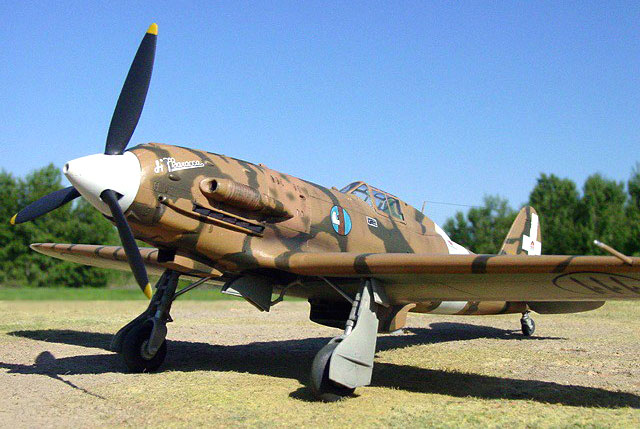
|
|
Macchi C.202 Serie III |

HyperScale is proudly sponsored by Squadron.com
This is Hasegawa's 1/48 Macchi C.202 Folgore. The
markings represent a Serie III aircraft flown by Capt. Franco
Lucchini, commander of 84a Squadriglia, 10th Stormo, September 1942.
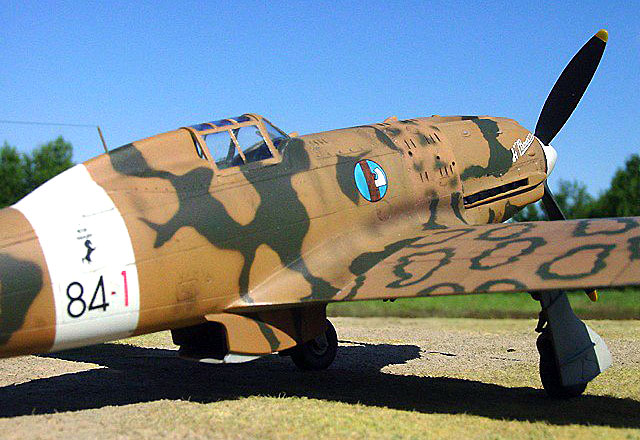
A few minor enhancements/modifications were made to the model during
construction:
-
Wing tip lights were
fashioned from pieces of clear sprue. Tamiya clear red (port wing) or
clear green (starboard wing) acrylic was added to a hole drilled on the
inside of each light.
-
The flaps on the
horizontal stabilizers were repositioned.
-
The early style antenna
post and antenna wire were made from stretched sprue.
-
Decals are from Sky
Models.
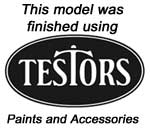 Polly
Scale acrylics were used for all painting. Polly
Scale acrylics were used for all painting.
The cockpit was painted Italian interior green.
Small amounts of SnJ aluminum polishing powder were touched lightly to
specific areas of the cockpit (e.g., seat, floor) to simulate worn
paint. When done sparingly with a cotton swab this technique produces a
very subtle and convincing worn-paint effect.
The white fuselage band and wing tips were painted and masked prior to
painting the rest of the model. The underside of the wings was then
painted Italian light blue gray.
This particular C.202 has an unusual upper camouflage scheme in two
respects. First, the large green patches/bands on the fuselage, tail,
and port wing were not as common on Folgores as were small patches or
rings of green. Second, the starboard wing of this aircraft is clearly a
replacement because it bears the "green-ring" camouflage pattern found
on later variants of the C.202. Photographs of this aircraft and its
unusual appearance can be seen on page 61 of Osprey's "Italian Aces of
WWII". A color profile is also provided in the book.
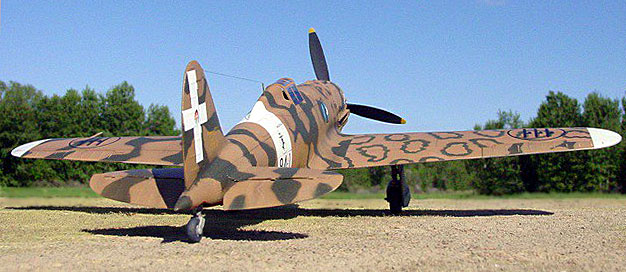
The upper surfaces were painted first in Italian Hazel Tan (with a touch
of dark brown) followed by Italian dark green. A slightly lighter shade
of tan was applied to the starboard wing. Masking was used for all areas
painted in green.
On the port wing, stabilizers and tail I used
raised paper masks, whereas on the fuselage I resorted to UHU tac for
masking because it conformed better to the complex curves of the model.
For the rings on the starboard wing I used a combination of the two
techniques. I first attached a paper template with a patchwork of holes
to the wing. I then used UHU tac to fill the center of each hole,
leaving only the outer ring exposed for painting. I found this method
more satisfactory than freehand airbrushing because it produced little
overspray.
The images were taken outdoors on a sunny day with
a SONY digital camera set at its highest picture resolution (2048 x 1536
pixels). Other camera settings were as follows: 200 ISO film speed (it's
an option on my digital camera), 800-1000th/sec shutter speed, F-stop
8.0, and fixed focus distance of either 20 or 30 cm. Images were cleaned
up using Adobe Photoshop 6.0 for the Macintosh.
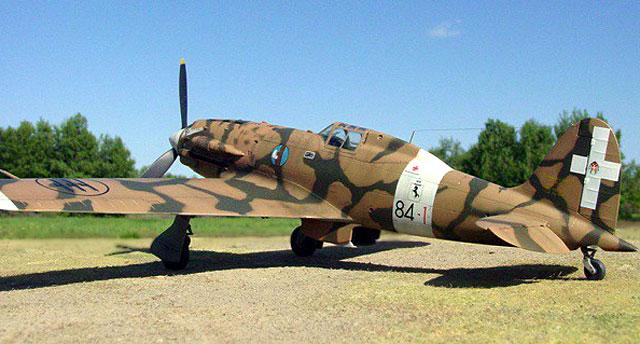
Specifically, the interface between the base and
background were merged using the software's "blur" tool, and edges in
some photographs were sharpened using the "sharpen edges" tool.
Sharpening images in such a way helps to restore some of the clarity
lost during image compression.
Click on the thumbnails
below to view larger images:
Model, Images and Text Copyright ©
2003 by Ian Robertson
Page Created 21 June, 2003
Last Updated 17 March, 2004
Back to HyperScale
Main Page
|
Home |
What's New |
Features |
Gallery |
Reviews |
Reference |
Forum |
Search